CORPORATE ACTION
EMF 2020 DATA SHOWS MOST CPG COMPANIES FAILING TO REDUCE PLASTICS USE (But you wouldn’t know that from reading its report)
Ellen MacArthur Foundation has gathered together the world’s most comprehensive dataset for assessing corporate progress on plastic abatement, but its first report on progress fails to layout basic progress insights or address core questions. It’s a shame. We prepared a company by company analysis that assesses progress and put a few highlights below. Contact us for more…
First data on progress
On November 5, 2020 the Ellen MacArthur Foundation along with the UN Environment Programme (UNEP), published its second annual New Plastics Economy Global Commitment Progress report, including detailed data on the progress of individual business and government signatories.
This is the first opportunity to assess how well signatory companies are doing in their effort to reduce plastic use. As EMF says, “After a quantitative baseline was set by the first report in 2019, this 2020 report provides the first insight into the trajectory of progress against that baseline.”
EMF’s failure to be clear
But EMF fails to make clear “insight into the trajectory of progress”. A basic and critical insight is that many leading signatory companies are now using more plastic than the 2018 baseline, and are using it at a higher rate per unit of sales.
At no point in EMF’s report does it layout whether each company is using more or less plastic. None of its 5 ‘Key progress metrics’ look at how much plastic each of its signatories is using, whether plastic use is going up or down or how efficiently companies use plastic.
Instead, EMF focuses on often peripheral points. Its first ‘Key progress metric’, for instance, highlights that 100% of governments have “measures in place to stimulate elimination of plastic packaging”. The second metric highlights that the share of reusable plastic packaging of CPG and retail signatories is 1.9%, up 0.1pp.
EMF seems fearful of offending its (money paying) signatories, preferring to focus on inoffensive and often congratulatory general commentary.
Data
We took published EMF plastic usage data for 2018 and 2019 and prepared a comparison that shows how signatories are performing. Where possible, we filled any EMF data holes with plastic usage data published in corporate CSR and sustainability reports, accepting these may have been prepared under different definitions.
Plastic use flat or rising at most companies
This data shows that for 13 large CPG companies that provided data for 2018 and 2019:
On average, reductions in plastic use are greater than increases and, overall, the total amount of plastic used by these 13 companies fell by 177k tonnes (0.01% lower than 2018).
However, almost all of this is due to a notable reduction in plastic use by Nestlé, which lowered plastic use by 176k tonnes (10.4% of its 2018 baseline), nearly 9x the amount reduced by the next best performer. Nestlé’s reduction in plastic use is especially impressive since it exceeds the total amount of all packaging it avoided since 2015.
On its website, Nestlé says, “Through our eco-design process, we managed to avoid the use of more than 142,000 metric tons of packaging materials by the end of 2019, compared to a baseline of 2015”.
In its 2019 Creating Shared Value Progress Report, the company gives a more precise figure: “In 2019, the volume of packaging avoided since 2015 rose to 142663 tonnes”.
We have contacted Nestlé to better understand what it did to lower plastic use so dramatically and to understand how its plastic packaging used can decline in one year by a higher amount than the total packaging it avoided using over five years.
Excluding Nestlé, in case its figure is in error or the result of a methodological change, the overall plastic consumption by these 12 companies fell 1k tonnes, or about 0.01%.
Companies using plastic less efficiently
A key aim of plastic abatement strategies is to enable companies to use plastic more efficiently, which we measure with our plastic intensity index. This shows how much plastic each company uses for each unit of $ sales. Sales tend to rise so stable plastic use would mean more efficient use of plastic, but even on this measure CPGs are failing.
Of the 13 companies, just 4 have a better plastic index performance. The remaining 8 perform worse. In other words, these companies – Barilla, Danone, Henkel, L’Occitane, Mars, McCormick, SC Johnson and Unilever – use more plastic per unit of sales than their baselines.
A look at HPC
Four companies centered on home and personal care (Colgate, Henkel, SC Johnson and Unilever) provided 2018 and 2019 data and allow a comparison across broadly similar businesses.
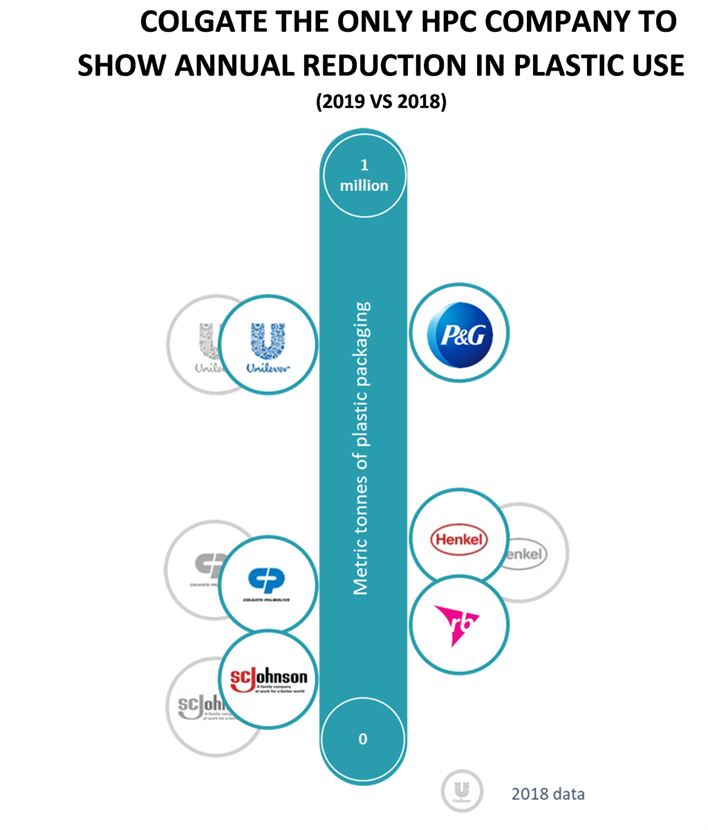
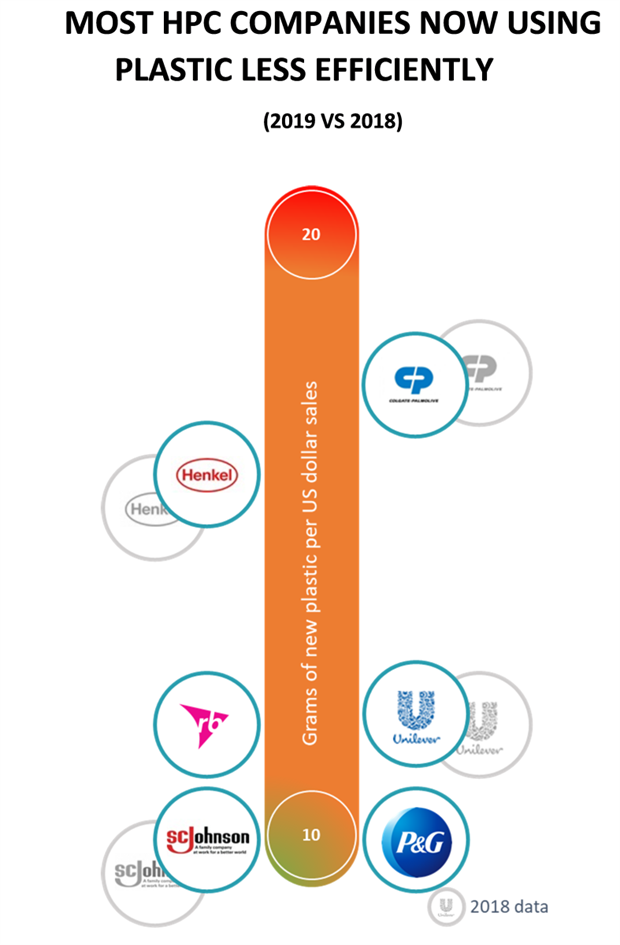
The picture is worse looking at plastic intensity and how efficiently these companies use plastic:
[Image Credit: © Business360]
First data on progress
On November 5, 2020 the Ellen MacArthur Foundation along with the UN Environment Programme (UNEP), published its second annual New Plastics Economy Global Commitment Progress report, including detailed data on the progress of individual business and government signatories.
This is the first opportunity to assess how well signatory companies are doing in their effort to reduce plastic use. As EMF says, “After a quantitative baseline was set by the first report in 2019, this 2020 report provides the first insight into the trajectory of progress against that baseline.”
EMF’s failure to be clear
But EMF fails to make clear “insight into the trajectory of progress”. A basic and critical insight is that many leading signatory companies are now using more plastic than the 2018 baseline, and are using it at a higher rate per unit of sales.
At no point in EMF’s report does it layout whether each company is using more or less plastic. None of its 5 ‘Key progress metrics’ look at how much plastic each of its signatories is using, whether plastic use is going up or down or how efficiently companies use plastic.
Instead, EMF focuses on often peripheral points. Its first ‘Key progress metric’, for instance, highlights that 100% of governments have “measures in place to stimulate elimination of plastic packaging”. The second metric highlights that the share of reusable plastic packaging of CPG and retail signatories is 1.9%, up 0.1pp.
EMF seems fearful of offending its (money paying) signatories, preferring to focus on inoffensive and often congratulatory general commentary.
Data
We took published EMF plastic usage data for 2018 and 2019 and prepared a comparison that shows how signatories are performing. Where possible, we filled any EMF data holes with plastic usage data published in corporate CSR and sustainability reports, accepting these may have been prepared under different definitions.
Plastic use flat or rising at most companies
This data shows that for 13 large CPG companies that provided data for 2018 and 2019:
- Just 4 claim to have reduced overall plastic usage (Colgate, Danone, L’Occitane and Nestlé)
- Three companies claim, somewhat surprisingly, to have used exactly the same amount of plastic in both 2018 and 2019 (McCormick, Unilever and PepsiCo)
- The remaining five companies all used more plastic in 2019 than the 2018 baseline (Barilla, Coca-Cola, Henkel, L’Oréal, Mars and SC Johnson)
On average, reductions in plastic use are greater than increases and, overall, the total amount of plastic used by these 13 companies fell by 177k tonnes (0.01% lower than 2018).
However, almost all of this is due to a notable reduction in plastic use by Nestlé, which lowered plastic use by 176k tonnes (10.4% of its 2018 baseline), nearly 9x the amount reduced by the next best performer. Nestlé’s reduction in plastic use is especially impressive since it exceeds the total amount of all packaging it avoided since 2015.
On its website, Nestlé says, “Through our eco-design process, we managed to avoid the use of more than 142,000 metric tons of packaging materials by the end of 2019, compared to a baseline of 2015”.
In its 2019 Creating Shared Value Progress Report, the company gives a more precise figure: “In 2019, the volume of packaging avoided since 2015 rose to 142663 tonnes”.
We have contacted Nestlé to better understand what it did to lower plastic use so dramatically and to understand how its plastic packaging used can decline in one year by a higher amount than the total packaging it avoided using over five years.
Excluding Nestlé, in case its figure is in error or the result of a methodological change, the overall plastic consumption by these 12 companies fell 1k tonnes, or about 0.01%.
Companies using plastic less efficiently
A key aim of plastic abatement strategies is to enable companies to use plastic more efficiently, which we measure with our plastic intensity index. This shows how much plastic each company uses for each unit of $ sales. Sales tend to rise so stable plastic use would mean more efficient use of plastic, but even on this measure CPGs are failing.
Of the 13 companies, just 4 have a better plastic index performance. The remaining 8 perform worse. In other words, these companies – Barilla, Danone, Henkel, L’Occitane, Mars, McCormick, SC Johnson and Unilever – use more plastic per unit of sales than their baselines.
A look at HPC
Four companies centered on home and personal care (Colgate, Henkel, SC Johnson and Unilever) provided 2018 and 2019 data and allow a comparison across broadly similar businesses.

- Overall, these four companies increased plastic usage by 132 tonnes
- Both SC Johnson (+9,700 tonnes) and Henkel (+2,000 tonnes) increased plastic usage
- Unilever reported exactly the same each year
- Colgate decreased plastic usage by 11,568 tonnes

The picture is worse looking at plastic intensity and how efficiently these companies use plastic:
- Only Colgate improved its plastic index (by 5%)
- The remaining three used plastic less efficiently in 2019
- Overall, for these four companies, plastic use increased nearly 3% faster than sales
CORPORATE ACTION: AmorePacific
Amorepacific Opens Refill Station For Shampoo And Body Wash, First In Korea
 South Korean beauty brand Amorepacific has unveiled a refill station for 15 shampoo and body wash products at the recently opened Amore Store Gwanggyo. The refill station sells by the volume requested and uses a recyclable refill container made with coconut shells. Products are only sold within 100 days of being produced, and the refill containers are disinfected before use with an ultraviolet LED lamp.[Image Credit: © Amorepacific ]
South Korean beauty brand Amorepacific has unveiled a refill station for 15 shampoo and body wash products at the recently opened Amore Store Gwanggyo. The refill station sells by the volume requested and uses a recyclable refill container made with coconut shells. Products are only sold within 100 days of being produced, and the refill containers are disinfected before use with an ultraviolet LED lamp.[Image Credit: © Amorepacific ]
CORPORATE ACTION: Beiersdorf
Beiersdorf Announces Body Lotion Packaging With 50% Less Plastic
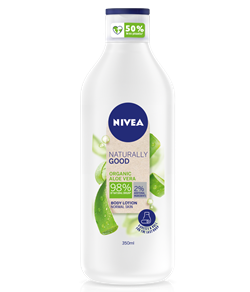
Beiersdorf has announced that the bottle and cap for its new NIVEA Naturally Good Body Lotion is designed to use 50% less plastic than similar NIVEA body lotion packaging. The company said this packaging move is part of its Reduce, Reuse, Recycle, and Replace (4R’s) packaging sustainability initiative. Beiersdorf’s 4R’s initiative aims to convert 90% of its PET bottles in Europe to include post-consumer recycled plastic. This program will save more than 1,200 tons of fossil-based virgin plastic each year, the company said.[Image Credit: © Beiersdorf]
CORPORATE ACTION: Colgate
Colgate-Palmolive Announces Sustainability And CSR Strategy For 2025
 Colgate-Palmolive Company announced its 2025 Sustainability & Social Impact Strategy, which defines the company’s sustainability and social responsibility initiatives for 2025 and beyond. The plan focuses on three objectives: promotion of well-being and inclusivity; helping people develop healthy habits; and preserving and improving the environment. Included in the company’s list of social and sustainability initiatives are the elimination of one-third of new plastics as part of its move to 100% recyclable, reusable, or compostable plastic packaging; earning 100% TRUE Zero Waste certification for worldwide operations, and sourcing 100% renewable electricity for global operations by 2030.[Image Credit: © Colgate]
Colgate-Palmolive Company announced its 2025 Sustainability & Social Impact Strategy, which defines the company’s sustainability and social responsibility initiatives for 2025 and beyond. The plan focuses on three objectives: promotion of well-being and inclusivity; helping people develop healthy habits; and preserving and improving the environment. Included in the company’s list of social and sustainability initiatives are the elimination of one-third of new plastics as part of its move to 100% recyclable, reusable, or compostable plastic packaging; earning 100% TRUE Zero Waste certification for worldwide operations, and sourcing 100% renewable electricity for global operations by 2030.[Image Credit: © Colgate]
CORPORATE ACTION: Henkel
Authentic Beauty Concept Launches Refill Stations In Salons Across Europe
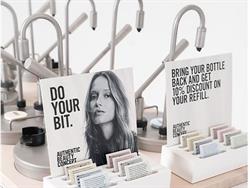 Authentic Beauty Concept, a Henkel brand, is launching refill stations for its haircare products in selected hair salons across Europe. The company offers lines of haircare products based on vegan formulas and made without silicones, sulfates, parabens, and other toxic and harmful ingredients. The company’s refill concept involves the hair stylist recommending the appropriate haircare products for the customer and then filling a recycled bottle with the Authentic Beauty Concept product. Once empty, the customer can bring the bottle, made from 92% recycled plastic, back to the salon for a refill.[Image Credit: © Henkel]
Authentic Beauty Concept, a Henkel brand, is launching refill stations for its haircare products in selected hair salons across Europe. The company offers lines of haircare products based on vegan formulas and made without silicones, sulfates, parabens, and other toxic and harmful ingredients. The company’s refill concept involves the hair stylist recommending the appropriate haircare products for the customer and then filling a recycled bottle with the Authentic Beauty Concept product. Once empty, the customer can bring the bottle, made from 92% recycled plastic, back to the salon for a refill.[Image Credit: © Henkel]
CORPORATE ACTION: Nestlé
Purina Launches Cat Litter With Earth-Friendly Packaging Via Loop’s Circular Shopping Platform
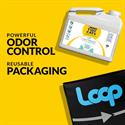 Purina Tidy Cats said it has launched the LightWeight Free & Clean cat litter through the Loop shopping platform for food and household products with reusable and refillable packaging. The new cat litter comes in a refillable jug the company says is environment friendly. Consumers can sign up to Loop’s eCommerce platform to have their empty jugs collected, cleaned, and reused as part of the platform’s circular shopping system.[Image Credit: © Nestlé]
Purina Tidy Cats said it has launched the LightWeight Free & Clean cat litter through the Loop shopping platform for food and household products with reusable and refillable packaging. The new cat litter comes in a refillable jug the company says is environment friendly. Consumers can sign up to Loop’s eCommerce platform to have their empty jugs collected, cleaned, and reused as part of the platform’s circular shopping system.[Image Credit: © Nestlé]
CORPORATE ACTION: PepsiCo
PepsiCo Redesigns And Makes 1970s Two-Liter Bottle More Earth-Friendly
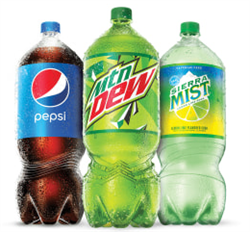 PepsiCo has redesigned the two-liter bottle for its soft drink products. The redesign started in 2018 when the company decided to address consumer complaints regarding the design and ergonomics of the original two-liter bottle. The original bottle measured 13.4 inches in circumference, which made it hard to hold for the average hand, which measures between 7 inches and 8 inches. The new design also allowed the company to reduce the plastic used in making the new two-liter bottle, which has retained most of the appearance of the original bottle but is technically 25% slimmer.[Image Credit: © PepsiCo]
PepsiCo has redesigned the two-liter bottle for its soft drink products. The redesign started in 2018 when the company decided to address consumer complaints regarding the design and ergonomics of the original two-liter bottle. The original bottle measured 13.4 inches in circumference, which made it hard to hold for the average hand, which measures between 7 inches and 8 inches. The new design also allowed the company to reduce the plastic used in making the new two-liter bottle, which has retained most of the appearance of the original bottle but is technically 25% slimmer.[Image Credit: © PepsiCo]
CORPORATE ACTION: Tesco
Tesco Revises Packaging For Private-Label Cheeses, Expects To save 260 Tonnes Of Plastic
 UK retailer Tesco said it is replacing the traditional square block packaging of its private-label hard cheeses with oblong packaging. The company expects to save 260 tonnes of plastic each year from the packaging switch, which also includes removing the resealable zip and introducing new pack sizes. Tesco’s sustainable packaging move will cover almost 40 lines of its own-brand hard cheeses.[Image Credit: © Tesco plc]
UK retailer Tesco said it is replacing the traditional square block packaging of its private-label hard cheeses with oblong packaging. The company expects to save 260 tonnes of plastic each year from the packaging switch, which also includes removing the resealable zip and introducing new pack sizes. Tesco’s sustainable packaging move will cover almost 40 lines of its own-brand hard cheeses.[Image Credit: © Tesco plc]
CORPORATE ACTION: Unilever
Unilever MENA Says More Than 70% Of Local Packaging Can Be Recycled
 Unilever said more than 70% of its packaging in the Middle East and North Africa (MENA) region is now recyclable. The company, which owns beauty brands including Dove, Love Beauty & Planet, and Lux, has achieved this as part of its pledge to make its plastic packaging 100% recyclable by 2025. Other sustainable packaging steps taken by Unilever MENA include the use of biodegradable material for its Lipton tea bags, while the tea’s outer packaging was made recyclable by the division’s local refreshments research and development team.[Image Credit: © Unilever plc]
Unilever said more than 70% of its packaging in the Middle East and North Africa (MENA) region is now recyclable. The company, which owns beauty brands including Dove, Love Beauty & Planet, and Lux, has achieved this as part of its pledge to make its plastic packaging 100% recyclable by 2025. Other sustainable packaging steps taken by Unilever MENA include the use of biodegradable material for its Lipton tea bags, while the tea’s outer packaging was made recyclable by the division’s local refreshments research and development team.[Image Credit: © Unilever plc]
Unilever Reports Significant Gains In Use Of Recycled Plastics
Unilever said that, as of October 2020, post-consumer recycled plastic or PCR accounts for more than 10% of the plastics used by the company in its business operations. Also, the company is using materials other than plastic where applicable, including recyclable paper-based ice cream tubs, which will help the company remove 4,500 tonnes of plastic from its manufacturing and packaging. These will help the company achieve its goals of cutting by half its use of virgin plastic in packaging and removing 100,000 tonnes of plastic by 2025.
CORPORATE ACTION: Other
SC Johnson Claims Significant Progress On The Way To 2025 Plastic Recycling Targets
 SC Johnson said it is “making significant progress” in achieving its anti-plastic pollution targets for 2025. The company’s progress is highlighted in the recently published New Plastics Economy Global Commitment 2020 Progress Report from the Ellen MacArthur Foundation. Some of SC Johnson’s 2025 targets include increasing by threefold the amount of post-consumer recycled plastic content in packaging and removing excess plastics wherever possible.[Image Credit: © SC Johnson]
SC Johnson said it is “making significant progress” in achieving its anti-plastic pollution targets for 2025. The company’s progress is highlighted in the recently published New Plastics Economy Global Commitment 2020 Progress Report from the Ellen MacArthur Foundation. Some of SC Johnson’s 2025 targets include increasing by threefold the amount of post-consumer recycled plastic content in packaging and removing excess plastics wherever possible.[Image Credit: © SC Johnson]
Asda Opens New Store To Test Potential Sustainability Efforts
.png&width=125&height=60) Asda opened a new store in Middleton, Leeds, UK, that will serve as a test center for the supermarket chain’s sustainability ideas. The store hope its innovations will help customers reduce, reuse, and recycle plastics without the stress and difficulty that come with typical sustainability efforts. Asda added a number of features to the new store, including 15 refill stations and collections of environment-friendly products, such as tea bags from PG Tips and coffee beans from Taylors of Harrogate.
Asda opened a new store in Middleton, Leeds, UK, that will serve as a test center for the supermarket chain’s sustainability ideas. The store hope its innovations will help customers reduce, reuse, and recycle plastics without the stress and difficulty that come with typical sustainability efforts. Asda added a number of features to the new store, including 15 refill stations and collections of environment-friendly products, such as tea bags from PG Tips and coffee beans from Taylors of Harrogate.Unilever is a lead partner in the retail-based refill experiment, adding seven of its consumer brands, including Persil, PG Tips, Radox, Cif, Simple, Pukka, and Alberto Balsam. Asda’s refill trial will cover three refill models: Touch-free refill machines developed by Beauty Kitchen, in-home refills, and self-serve containers.[Image Credit: © Asda]
Shiseido Launches Global Sustainability Initiative
CAMPAIGNS, COMMITMENTS & NGOs
Henkel Starts Using Recycled Aluminum Tubes for Hair Coloring Products
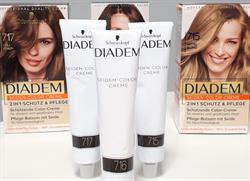
Henkel’s Beauty Care business has started using aluminum tubes made of 100% recycled material for its Hair Coloration collection of hair coloring products. The switch covers all of the company’s Retail and Professional brands worldwide, allowing Henkel to reduce energy used in virgin aluminum packaging by up to 95%.[Image Credit: © Henkel.com]
British Beauty Council Calls On Beauty Industry To Push For Sustainability
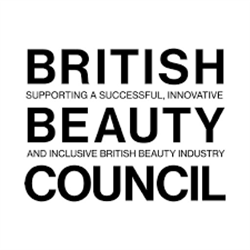 The British Beauty Council released a report aimed at initiating discussion and collective action on sustainability for the beauty products industry. The “Courage to Change” report comes with three most important messages: there is a fast-growing business case for sustainability; the industry needs to adopt transparency and openness, especially with its communication with consumers; and the industry needs to work and collaborate more closely with the UK government. Also, the report includes a collection of independent analysis and expert opinion on existing sustainability-focused industry actions and consumer trends. The report also called on the beauty industry to work together and with a sense of urgency to promote sustainability.[Image Credit: © British Beauty Council]
The British Beauty Council released a report aimed at initiating discussion and collective action on sustainability for the beauty products industry. The “Courage to Change” report comes with three most important messages: there is a fast-growing business case for sustainability; the industry needs to adopt transparency and openness, especially with its communication with consumers; and the industry needs to work and collaborate more closely with the UK government. Also, the report includes a collection of independent analysis and expert opinion on existing sustainability-focused industry actions and consumer trends. The report also called on the beauty industry to work together and with a sense of urgency to promote sustainability.[Image Credit: © British Beauty Council]
Ellen MacArthur Foundation Launches Version 2.0 Of Circular Economy Testing Tool
ALLIANCES, PARTNERSHIPS & JVs
Loop Industries Loses Coca-Cola’s Business, Faces Lawsuits And SEC Investigation
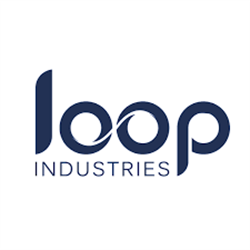 Coca-Cola Cross Enterprise Procurement Group (CEPG) plans to end its 2018 recycled-PET supply agreement with recycling company Loop Industries effective December 14, 2020. Loop Industries, a publicly traded startup selling monoethylene glycol and dimethyl terephthalate made from used PET broken down using a low-heat, pressureless process, is also facing lawsuits and is being investigated by regulators. Earlier, Hindenburg Research, which had a short position on Loop, released a report claiming the startup is a “smoke and mirrors show.” Loop also said the company and some of its officers were named as defendants in two shareholder lawsuits, while the U.S. Securities and Exchange Commission issued a subpoena for the company’s records on October 15, 2020.[Image Credit: © Loop Industries]
Coca-Cola Cross Enterprise Procurement Group (CEPG) plans to end its 2018 recycled-PET supply agreement with recycling company Loop Industries effective December 14, 2020. Loop Industries, a publicly traded startup selling monoethylene glycol and dimethyl terephthalate made from used PET broken down using a low-heat, pressureless process, is also facing lawsuits and is being investigated by regulators. Earlier, Hindenburg Research, which had a short position on Loop, released a report claiming the startup is a “smoke and mirrors show.” Loop also said the company and some of its officers were named as defendants in two shareholder lawsuits, while the U.S. Securities and Exchange Commission issued a subpoena for the company’s records on October 15, 2020.[Image Credit: © Loop Industries]
CONSUMER & PUBLIC OPINION
Gillette: COVID-19 Drives More Men To Support Sustainability Efforts
MARKET NEWS
Pharrell Williams Launches Humanrace Line Of Skincare Products With Sustainable Packaging
Supublic Announces Dissolvable Cleaning Tablets
 South Korean brand Supublic has announced a line of cleaning tablets that can be dissolved in water and function as an alternative to liquid-based cleaning products. The tablets come in three colors: blue for multi-purpose cleaning, yellow for the bathroom, and orange for the kitchen. The tablets come with natural ingredients and scents: blue for orange and lavender; yellow for coconut and mint; and orange for lemon and thyme. Consumers can dissolve the tablets, which come with concentrated non-toxic cleaning agents, in water to create 430ml of cleaning liquid. The company dubbed the tablets as 1N9 Modern Cleaner, referring to the ratio of 10% detergent to 90% water. First-time buyers can purchase three color-coded and labelled reusable bottles that can be refilled with 1N9 cleaning solutions.[Image Credit: © Supublic ]
South Korean brand Supublic has announced a line of cleaning tablets that can be dissolved in water and function as an alternative to liquid-based cleaning products. The tablets come in three colors: blue for multi-purpose cleaning, yellow for the bathroom, and orange for the kitchen. The tablets come with natural ingredients and scents: blue for orange and lavender; yellow for coconut and mint; and orange for lemon and thyme. Consumers can dissolve the tablets, which come with concentrated non-toxic cleaning agents, in water to create 430ml of cleaning liquid. The company dubbed the tablets as 1N9 Modern Cleaner, referring to the ratio of 10% detergent to 90% water. First-time buyers can purchase three color-coded and labelled reusable bottles that can be refilled with 1N9 cleaning solutions.[Image Credit: © Supublic ]
PACKAGING REDESIGNS
Meiyume Launches Line Of Aluminum Packaging As Recyclable Alternative To Plastic Beauty Packaging
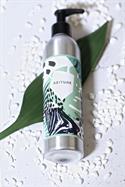
Hong Kong-based Meiyume has launched the Infinite Aluminium Packaging line of aluminum packaging products designed for the beauty industry. The company promotes the product line as a sustainable and easy-to-recycle alternative to plastic packaging. Aluminum takes a lot of energy to produce, but it can be recycled with less than 10% of that energy.[Image Credit: © Meiyume ]
POLICY, REGULATION & LEGAL
EU Requires Extra Additional Stringent Tests For Biodegradable Plastic Products
 Packaging products made from biodegradable plastics need to go through the same testing procedures that conventional plastic products undergo before they can be sold or used in the European Union market. They also need to pass additional tests before they can be certified as biodegradable or compostable. And when these plastics are used for food packaging there are additional requirements. Commission Regulation No. 10/2011 sets a maximum permitted quantity of an ingredient to transfer into food from packaging, while EU standard EN 13432 sets limits for heavy metals and other harmful substances in biodegradable plastics used in industrial composting.[Image Credit: © European Uniton]
Packaging products made from biodegradable plastics need to go through the same testing procedures that conventional plastic products undergo before they can be sold or used in the European Union market. They also need to pass additional tests before they can be certified as biodegradable or compostable. And when these plastics are used for food packaging there are additional requirements. Commission Regulation No. 10/2011 sets a maximum permitted quantity of an ingredient to transfer into food from packaging, while EU standard EN 13432 sets limits for heavy metals and other harmful substances in biodegradable plastics used in industrial composting.[Image Credit: © European Uniton]
INNOVATION & TECHNOLOGY
Henkel Brings EPIX Paper Packaging Enhancement Technologies To Europe
 Henkel Adhesive Technologies is launching its EPIX lineup of technologies and materials designed for paper packaging. EPIX technologies make paper packaging a sustainable alternative to plastic packaging products. They improve paper packaging by adding plastic-like properties, such as barrier protection, impact resistance, and heat insulation.[Image Credit: © Henkel]
Henkel Adhesive Technologies is launching its EPIX lineup of technologies and materials designed for paper packaging. EPIX technologies make paper packaging a sustainable alternative to plastic packaging products. They improve paper packaging by adding plastic-like properties, such as barrier protection, impact resistance, and heat insulation.[Image Credit: © Henkel]
LanzaTech, Total, L’Oréal Collaborate To Make Plastic Bottle From Recycled Carbon Emissions
Copyright 2026 Business360, Inc.

